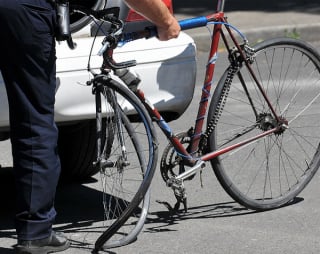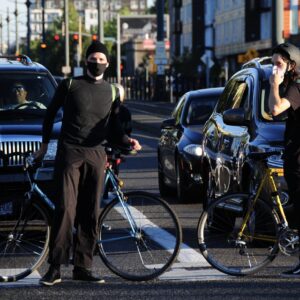
(Photo by J. Maus/BikePortland)
(This is the second (and final) part of our in-depth look at property damage claims by Portland lawyer Ray Thomas*. See the first part here.)
V. Gear and Rental List
Sometimes riders are discouraged because the responsible driver’s insurance company fails to promptly pay on the property damage claim. In auto v. auto cases, property damage claims get settled promptly because claims adjusters are accustomed to providing a rental car while the damaged vehicle is in the shop getting fixed. The same law applies to bicycles – the bicycle rider is entitled to a rental vehicle or bus fare, ride-share costs or other reasonable expenses for the time it takes to get the damaged bicycle fixed and serviceable again. One tip for adding speed to the property damage disposition is to have the quote at the bicycle shop include the cost of a comparable rental bicycle by the day, week, and month so that the rider can let the adjuster know how the cost of delay is going to be transferred to the insurance company.
The same rules apply for other personal items such as helmet, panniers, clothing, and other personal property. If the clothing is new and you still have a receipt, it will be helpful for the bike shop in making an appraisal. If the property is older, the shop will need to know when you purchased it and the condition it was in prior to the collision. Finally, it is important that you save all property damaged so that you can show it to the adjuster if asked.
VI. ORS 20.080 – When the Offer is Unfair
We frequently hear from angry bicyclists who feel they are not being dealt with fairly in determining who was at fault in the accident, or the value of damaged property. Few bicyclists are willing to go to small claims court to advocate for themselves. Unfortunately, this means that riders frequently grudgingly accept “low ball” offers to settle property damage claims. One tool that does exist for bicyclists is a law that gives a victim a negotiating edge. ORS 20.080 provides that in claims for less than $10,000 if a thirty-day demand letter is sent to the responsible party and is not paid, and the victim gets a lawyer and files a successful lawsuit, the responsible party has to pay the amount originally owed, plus attorney fees and costs. In a simple property damage claim the attorney fees and costs could total several thousand dollars. If a bicycle rider is in negotiations and is being treated unfairly, it will probably be of assistance to mention this law because if the bicyclist has to go out and hire a lawyer to file a lawsuit and wins the case then the amount awarded as costs and fees may very well exceed the amount owed in the first place.
The statutory provision is contained in its entirety below:
ORS 20.080 Attorney fees in actions for damages for personal or property injury.
(1) In any action for damages for an injury or wrong to the person or property, or both, of another where the amount pleaded is $10,000 or less, and the plaintiff prevails in the action, there shall be taxed and allowed to the plaintiff, at trial and on appeal, a reasonable amount to be fixed by the court as attorney fees for the prosecution of the action, if the court finds that written demand for the payment of such claim was made on the defendant, and on the defendants insurer, if known to the plaintiff, not less than 30 days before the commencement of the action or the filing of a formal complaint under ORS 46.465 (Time and place of hearing), or not more than 30 days after the transfer of the action under ORS 46.461 (Counterclaims). However, no attorney fees shall be allowed to the plaintiff if the court finds that the defendant tendered to the plaintiff, prior to the commencement of the action or the filing of a formal complaint under ORS 46.465 (Time and place of hearing), or not more than 30 days after the transfer of the action under ORS 46.461 (Counterclaims), an amount not less than the damages awarded to the plaintiff.
(2) If the defendant pleads a counterclaim, not to exceed $10,000, and the defendant prevails in the action, there shall be taxed and allowed to the defendant, at trial and on appeal, a reasonable amount to be fixed by the court as attorney fees for the prosecution of the counterclaim.
VII. Conclusion
Property damage claims can be very frustrating for riders who are trying to represent themselves to get a fair recovery for their damaged equipment. Knowledge of the law helps to make the process a little easier, but, in the final analysis, fair payment on damaged property claims requires a willingness to spend the time necessary to present the proof of loss, and persevere through negotiations to obtain fair payment.
(*Ray’s law firm, Swanson, Thomas, Coon & Newton is a BikePortland advertiser and this article is part of our marketing partnership.






Thanks for reading.
BikePortland has served this community with independent community journalism since 2005. We rely on subscriptions from readers like you to survive. Your financial support is vital in keeping this valuable resource alive and well.
Please subscribe today to strengthen and expand our work.
Oooh. Point VI is the most helpful – really good to know.
fair payment on damaged property claims requires a willingness to spend the time
Pretty obvious biz stuff but anyway… generic “you” might want to consider when to cut your losses with some simple cost comparisons:
(property value) / (time value/hour) = (cost-effective time spent)
example: $800 claim / $40/hr = 20 hours
Your time value could be just your hourly rate but really you should include any benefits you get (insurance, leave, etc), and that marginal time you sell to your employer is your least valuable time so your own time is worth more. Adjust accordingly. (If you really enjoy insurance adjusters and formal legal procedures then you’re welcome to put the time value on your entertainment budget. And you’re weird.)
Thanks for the articles, Ray!
Something that I encountered years ago when I was hit by a car that ran a red light, was that the insurance company wanted me to give them my bike parts as part of the settlement. There was lots of back and forth and long-story-short, they kept insisting. I asked them if they asked for the parts from damaged cars and of course they said no.
I dug in my heels on this on principle and would not budge. They kept insisting that this was their policy. I told them that I was not their customer and the only “policy” I was bound by was Oregon law. Eventually they caved and I got compensation for the damaged parts and kept the damaged parts.
Don’t ever assume that the insurance companies are being honest when they tell you they have to do something a particular way.
Shout out to Mark Ginsberg who answered my calls and my questions during that case.